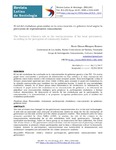El rol del ciudadano prosumidor en la comunicación de gobierno local según la percepción de representantes comunitarios

View/
Use this link to cite
http://hdl.handle.net/2183/22604
Except where otherwise noted, this item's license is described as Atribución-CompartirIgual 3.0 España
Collections
Metadata
Show full item recordTitle
El rol del ciudadano prosumidor en la comunicación de gobierno local según la percepción de representantes comunitariosAlternative Title(s)
The prosumer citizen´s role in the communication of the local government, according to the perception of community leadersAuthor(s)
Date
2018Citation
Revista Latina de Sociología,2018,8(1):65-81.ISSN: 2253-6469
Abstract
[Resumen] El rol del ciudadano ha cambiado en la comunicación de gobierno gracias a las TIC. Un nuevo papel como consumidor y productor de información no deja cabida a la vieja concepción del gobierno como único emisor y del ciudadano como receptor pasivo. Esta investigación utiliza el término prosumidor aportado por Alvin Toffler (1980), para analizar el papel del ciudadano en la relación comunicativa que establece con los gobiernos locales. A través de una metodología cualitativa, basada en el focus group como herramienta de recolección de información, se evidencia el papel activo del ciudadano en la comunicación de gobierno y la relevancia de planificar una comunicación dialógica para propiciar la participación ciudadana y formar cultura democrática. Se demuestra el interés de los ciudadanos por la participación, la comunicación y la interactividad, y se proponen categorías preliminares para el análisis del ciudadano-prosumidor. [Abstract] The role of citizen has changed in the government communication due to the new technologies. A new role as consumer and producer of information leaves no room for the old conception of government as the only emitter and the citizen as passive receiver. This research uses the term prosumer provided by Alvin Toffler (1980), to analyze the role of the citizens in the communicative relationship he or she establishes with local governments. Through a qualitative methodology, based on focus group as an instrument for data collection, the active role of the citizen in the government communication and the importance of planning a dialogic communication to promote citizen participation and to form a democratic culture is evidenced. Citizens' interest in participation, communication and interactivity is demonstrated and preliminary categories are proposed for the citizen-prosumer analysis
Keywords
Prosumidor
Ciudadano
Participación ciudadana
Comunicación de gobierno
Gobierno local
Prosumer
Citizen
Citizens’ participation
Government communication
Local government
Ciudadano
Participación ciudadana
Comunicación de gobierno
Gobierno local
Prosumer
Citizen
Citizens’ participation
Government communication
Local government
Editor version
Rights
Atribución-CompartirIgual 3.0 España
ISSN
2253-6469






